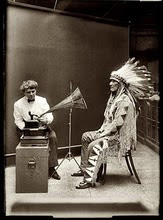You may have noticed that we've added automatically updating RSS feeds (what is RSS?) above and to the right column of the Greene Futures blog. The box at the top of this column is a widget which projects the articles we pick to share from our own Google Reader RSS subscriptions. With it, we will publish the most important and interesting pieces from our daily reading (encompassing 1000+ articles daily from 304 independent outlets, including news articles, blog posts, journal offerings, new books, and published reports). Greene Future's regular sources are listed to the bottom right-hand side of the blog. We spend hours every day combing through this mountain of information, running the gamut of world news, foreign affairs, trends, energy developments, scientific findings, technological innovations, environmental issues, business events and economic ramifications.
But for you, dear reader, we provide fertile seeds sorted from the chaff. Meaty, actionable intelligence wrestled from a tangle of information overload.
This is just one step in a series to make this site the most useful depot for its readers in all things related to future trends. There exists no satisfactory list of all the news outlets, futurist thinkers and analysis sources to date. It's a full-time job attempting to track down all the little bits of evidence from every corner of the information sphere, and an even more intimidating task groping toward some understanding of what it all means.
Please make sure and subscribe to the Greene Futures blog feed (click here to subscribe). It will allow you to automatically stay abreast of news, analysis and updates from Greene Futures through your favored RSS Reader (Google Reader, My Yahoo RSS, RSS Reader, etc.). And if you frankly have no idea what I've been talking about with all this RSS nonsense, check out the video below:

